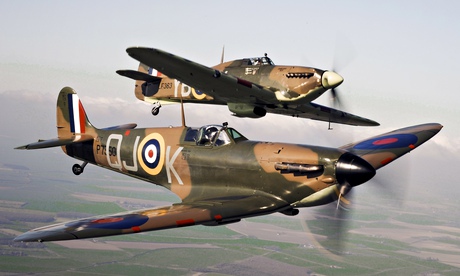
Early on in First Time Solo, Jack Devine, a farmer's son from Aberdeenshire, is called up to the RAF in 1943 and travels to London to join his fellow trainees. Then we get this:
"I followed the directions I'd been given to the underground station, showed my pass and traipsed down the stairs deep into the Earth. All very Jules Verne. The Underground. The idea of being on a train under the ground, under the river. I imagined them making it, digging the tunnels, boring through the rocks, the layers, strata, the history of the world stacked. Cambrian was it? Something else. Silurian. I knew it a year ago. Some of my fellow travellers could also be going to the Air Recruitment Centre. I spotted a pair consulting well-fingered instructions. Maybe I should say hello, I thought, and we could all be lost together."
All very Jules Verne? All very feeble. Why someone intending to fly a spitfire – in the air! – would be impressed with being under a river is beyond me. Clearly too, the whole history of the world isn't stacked in those strata. Do the rocks, for instance, tell us much about Hitler? Where does that "I knew it a year ago" situate the narrative voice? Sometime after the six-months that the narrative describes? But also before the underground ride? So about six months earlier? Or should the author in fact have written: "I had known it a year before." And no, he isn't lost, and nor is anyone else. They're on the Underground. Under the river!
I'm being obnoxious, I know. But at this stage in the reading process, my patience was severely tested. A few pages later Devine joins a conversation about the King's English and the royal person's stammer, in an obvious and painful reference to the recent film The King's Speech, that busts any illusion that this story might be taking place in 1943. In the normal course of things, I would have taken that as my cue to bury this book, under the ground. Duty compelled me to continue, however, and I'm relieved to report that it does improve.
There remain a few passages of brain-numbing banality: "The dinosaurs ruled the world once and where are they now? In display cases. Stored in the basement. Who's to say it won't happen to us?" On the whole, however, I didn't find much to offend. The main problem, indeed, is finding anything much that provokes any kind of reaction beyond a quiet shrug of the shoulders.
The story largely centres on Devine's experiences in flying school. I'd question the need for another book about training during the second world war when the shelves are already crammed with classics like Evelyn Waugh's Sword Of Honour trilogy and Roald Dahl's Going Solo. But I can at least sympathise with Iain Maloney for wanting to write First Time Solo since, in a touching note at the back, he explains it is largely based on his grandfather's memories and training log book.
The material gleaned from the grandfather about the training process is competent enough and provides a few interesting historical details about Tiger Moths, board and lodging and moody sergeants. Maloney also manages a few half-decent passages about the exhilaration of flight:
"There's an area. Most people never notice it, the space between land and sky. It's not like a line, a border where one stops and the other begins, rather there's a place where you're still in the sky, but under the influence of the land. It feels like gravity is heavier, stronger. At ten thousand feet you're free to move anyway you want. In those last feet it's magnetic. Every pilot knows that tension, the fight for control as you approach. It's like passing from one world into another, through some special zone between. The first time you fly through it, it scares the bollocks off you. A little wobble, reduced speed, taxied to a halt. Exhaled. The swagger that took me back to the lads after landing was more pronounced than ever. I'd fucking landed."
As I say, half-decent. Clearly it isn't Shakespeare, even if it's less ripe for the cruel kind of faux practical criticism I employed at the start of this review. The ideas about gravity and control are OK, but never quite – forgive me – take off.
The rest of the book is similarly half-done. There's a potentially intriguing strand about a Glaswegian psycho who causes the narrator a few good moral dilemmas, but doesn't carry the required air of menace and madness. There are a few good passages about the narrator's love of jazz, but they felt tacked onto the main narrative and I was still left wondering why someone growing up on a farm in 1930s Aberdeenshire became so interested in the music in the first place. The story ends on an interesting conceit: we never find out about Devine's career beyond his training. But again, Maloney doesn't quite carry it off and the conclusion felt flat and anti-climactic. Which pretty much sums up First Time Solo. It isn't awful, but it isn't any good either.
Next Time: The Smoke is Rising by Mahesh Rao

